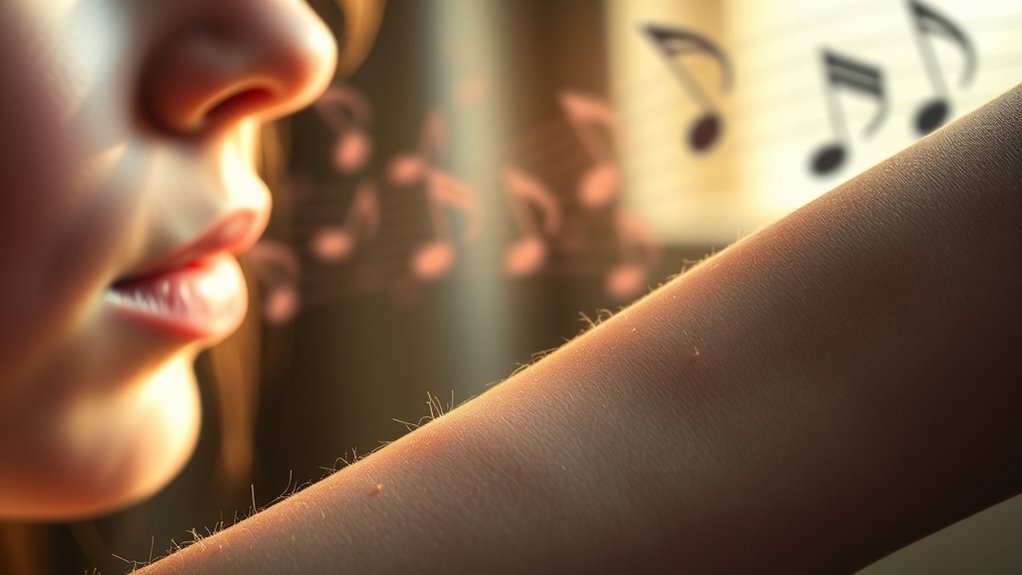When you get goosebumps from music, it means your emotional brain is deeply involved, triggering physical reactions like chills. This often happens during powerful moments that connect with your memories or feelings, releasing neurochemicals like dopamine that boost pleasure. Your personal history with a song influences how strong these reactions are. If you want to discover the science behind these emotional responses and why some individuals experience them more vividly, keep exploring this fascinating connection.
Key Takeaways
- Music activates emotional centers in the brain, leading to physical sensations like goosebumps during intense moments.
- Personal memories and nostalgia linked to songs amplify emotional responses, triggering goosebumps.
- Neurochemical releases such as dopamine during pleasurable musical experiences cause physical reactions.
- The brain interprets meaningful music as significant, prompting physical signs of emotional processing.
- Individual differences in emotional sensitivity and personal history influence the likelihood of experiencing musical goosebumps.

Have you ever experienced a sudden rush of chills or tingling sensations while listening to a song? If so, you’re not alone. That fleeting but intense feeling is often called a “musical goosebump,” and it happens to many people during powerful moments in music. These sensations aren’t random; they’re deeply connected to your brain’s emotional processing. When a song resonates with your personal memories or feelings, it can access a wave of emotional release and trigger these physical reactions. You might find yourself transported back to a special moment in your life, feeling a wave of nostalgia that floods through you. That’s musical nostalgia—an emotional connection to the past evoked by music. It’s this very sense of familiarity and longing that amplifies the emotional impact, making your body respond with those goosebumps.
The science behind this phenomenon is fascinating. Your brain reacts to music by releasing neurochemicals like dopamine, which is associated with pleasure and reward. When a song hits just the right note—whether it’s a lyrical phrase, a soaring melody, or a sudden crescendo—it activates the brain’s emotional centers. If that moment taps into a personal memory or a deeply held feeling, it intensifies the experience. This emotional release is what causes your body to react physically, with chills running down your spine or skin prickling. It’s as if your brain is saying, “Wow, that’s really meaningful.” The connection between music and emotional expression is so powerful that it can even provide comfort during tough times or amplify joy during celebrations. Moreover, research shows that music’s ability to influence mood involves complex interactions between auditory stimuli and emotional brain networks.
Your individual history with music plays a significant role in these reactions. Certain songs might remind you of loved ones, past experiences, or life milestones, making the emotional response even more visceral. The more personal the connection, the more likely you are to experience goosebumps. Curiously, not everyone reacts the same way; some people are more sensitive to these cues because of differences in brain wiring or emotional awareness. But whether you notice it or not, these physical responses are a sign of music’s profound ability to touch your inner self. It’s a testament to how deeply intertwined music and human emotion are—capable of stirring memories, providing emotional relief, and giving you that unforgettable rush of chills whenever a song hits just right.
Frequently Asked Questions
Can Listening to Certain Genres Increase Goosebumps?
You might notice that listening to certain genres can increase your goosebumps, especially when the music has high emotional intensity. Your genre preferences play a role, as some styles evoke stronger emotional responses. When a song resonates deeply, it can trigger physical reactions like goosebumps. So, exploring genres that align with your emotional triggers can heighten this sensation, making your listening experience even more immersive.
Do Genetic Factors Influence Goosebumps Response to Music?
You might wonder if genetic factors influence your goosebumps response to music. Your genetic predisposition can shape how your neural pathways process emotional stimuli, making you more or less likely to experience chills. These genetic influences affect the sensitivity of your brain’s reward system and neural connectivity, which determine your unique emotional reactions to music. So, yes, your genetics can play a significant role in whether music gives you goosebumps.
How Does Age Affect Music-Induced Goosebumps?
Like the shifting seasons, your age influences your emotional sensitivity to music. As you grow, you develop age-related emotional sensitivity, which can heighten your response to powerful melodies. Younger listeners often have more intense developmental music preferences, making them more prone to goosebumps. Conversely, with age, these responses may become more subdued, but personal experiences and nostalgia can rekindle that thrilling feeling, regardless of age.
Are There Cultural Differences in Experiencing Musical Chills?
You might notice cultural differences in experiencing musical chills because cultural expressions shape how emotions are interpreted. In some traditions, music is deeply intertwined with collective identity, making emotional interpretations more intense and likely to trigger goosebumps. Your cultural background influences how you respond to certain melodies or rhythms, so what gives you chills might not have the same effect on someone from a different culture.
Can Mindfulness or Meditation Reduce Music-Triggered Goosebumps?
Ever wonder if you can lessen music-triggered goosebumps? Practicing mindfulness and meditation techniques might help you control emotional reactions, including chills. By focusing on your breath and staying present, you could reduce your body’s automatic response to powerful music. While it may not eliminate the sensation completely, regular mindfulness practices can make you more aware of your feelings, helping you manage those intense moments and possibly diminish goosebumps.
Conclusion
So, next time a song gives you goosebumps, remember—it’s your brain’s way of saying, “Wow, this really matters.” Ironically, those chills aren’t just random; they’re your emotional spotlight, revealing what truly moves you. So, embrace the tingles, even if they make you feel a bit vulnerable. After all, it’s funny how music can turn a simple moment into a profound one—proof that sometimes, the smallest sensations leave the biggest mark.









